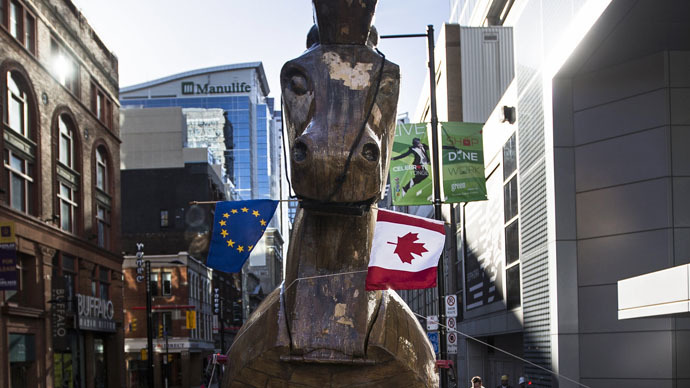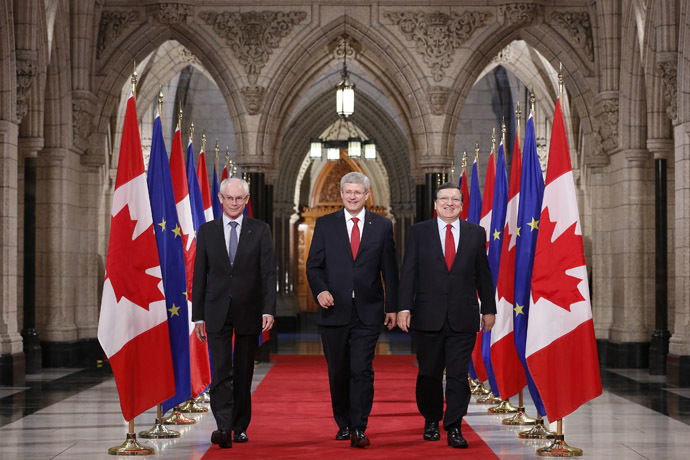CETA: Delayed but not destroyed

The European Commission and Canada have been negotiating over the Comprehensive Economic Trade Agreement (CETA) for five years. Now Germany has decided to throw a spanner in the works.
Representatives of the Canadian government, European Commission and Council held a formal ceremony to sign the CETA in Ottawa, Canada, last Friday. Herman Von Rompuy, president of the European Council, proclaimed “we celebrate the end of the negotiations.” But there was little reason to celebrate as Siegmar Gabriel, German economy and energy minister, called for the investor protection clause (ISDS) to be taken out of the agreement.
Unfortunately this postponement does not derail CETA but simply delays the process. After all, Siegmar Gabriel and the German government remain committed to both CETA and its US version, the TTIP. Gabriel stated in the parliamentary debate last week “CETA is a good agreement. It would be wrong to put it into question in a fundamental way or to break it.” However, his ministry’s legal assessment states that it is not clear who the negotiating partners are, thus buying time and re-opening the negotiations.
Gabriel must believe that a further delay and U-turn on ISDS provision could strengthen the coalition of the willing. So far, his strategy has borne success. The SPD Congress voted to continue both CETA and TTIP negotiations two weeks ago. The German trade union confederation DGB co-signed paper declaring its support for CETA and TTIP if investor protection is dropped from it. Now that the final text has been published other civil society organizations and NGOs might follow suit.
There is even bigger news! Cecilia Malmström of the European Commission tweeted that she would campaign against ISDS provision in the ongoing TTIP negotiations. While the tweets mysteriously disappeared, Jean-Claude Juncker’s office told German newspaper Weser Kurier the same thing. Gabriel has let the genie out of the bottle.
However, Gabriel’s politicking is not welcomed by the European Commission. EU Trade Commissioner Karel De Gucht told the Frankfurter Allgemeine Zeitung.

"If we re-open negotiations on CETA, the deal will be dead," he said. Implicitly, he also accused Angela Merkel of not doing enough to see the transatlantic trade deals through, saying she “should make a political point of it”. While Europeans would like to see the deal dead and buried, in Canada opinions differ.
In Canada, the agreement has been labeled the ‘Wayne Gretzky of all trade deals’. Ahead of the elections, Canadian Prime Minister Stephen Harper has claimed that the deal would create 18,000 new jobs, and that cheese-makers and other sectors would continue to receive aid. Furthermore, a joint Canadian-EU study argues that the agreement would boost bilateral trade by 20 percent and increase Canadian GDP by 0.7 percent each year. All these claims remain unverified promises which will be hard to keep in the face of a sluggish world economy.
Former Quebec Prime Minister Jean Charest could not care less about the facts. Last week he co-wrote a column in Toronto’s the Globe and Mail which heralded “new trade opportunities” and a “tide of rising prosperity.” Despite the fact that the North American Free Trade Agreement did not fulfill its promise of a new era in manufacturing and exports, Jean Charest calls the treaty “very welcome news.”
More importantly though, he names the real reason why ISDS provision ought to feature in CETA: “The rising economic and political power of emerging and increasingly aggressive economies also creates a much bigger geopolitical challenge.” In other words, if the European Union and Canada cannot agree on ISDS provision among themselves, they will not be able to impose it upon other trading partners. Moreover, judicial systems will have to be privatized, markets deregulated, and labor and environmental laws weakened, if they want to keep afloat with the rising economic powers of the BRICS states.
Ironically, Germany has been the inventor and main benefactor of such investor dispute clauses before the Swedish energy company Vattenfall sued the German government after it phased out its nuclear energy program for loss of profits under a similar clause. While the German public and politicians like Gabriel fear that US companies will use their Canadian subsidiaries to sue for potential loss of profits, international law expert Stephan Schill actually believes that Germany is likely to economically benefit from the new regulatory framework. He believes that foreign investors have enough legal protection already. So why is Germany stalling the process?
Economic and Energy Minister Siegmar Gabriel wants to renegotiate the ISDS provision for two reasons. First of all, he knows too well that the German public does not support this trade deal. Secondly, he wants to strengthen his bargaining position vis-à-vis the United States in the on-going TTIP negotiations. By using legal means, Gabriel and the German government shift the terrain of the discussion without upsetting their close political allies. Yet they can abdicate any responsibility if either of the agreements collapses. A savvy game, one would think.
But Gabriel forgets that all 28 EU member states’ parliaments will have to sign off CETA before it becomes law as well as both chambers of the German federal government. He is likely to stumble somewhere along the way.
The statements, views and opinions expressed in this column are solely those of the author and do not necessarily represent those of RT.
The statements, views and opinions expressed in this column are solely those of the author and do not necessarily represent those of RT.













